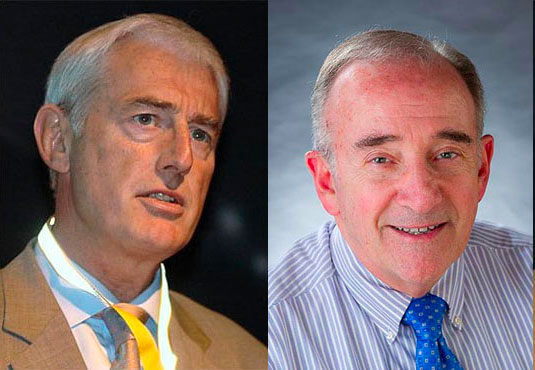Henry Ginsberg Articles

Lipoprotein(a) and atrial fibrillation – Is there a link?
PCSK9 Forum Co-editors Professors John Chapman and Henry Ginsberg discuss recent data. Atrial fibrillation (AF) is the most common arrhythmia, affecting about 0.5% (circa one in 200) of the worldwide population (1). Moreover, as populations age, prevalence has increased dramatically (2). Due to the associated risk…
read more »

What’s new on the horizon for lipoprotein(a) therapies?
For too long an enigma, lipoprotein(a) [Lp(a)] has now taken centre stage on the strength of epidemiologic and genetic studies showing that an elevated Lp(a) level is a causal risk factor for cardiovascular disease. However, there is a major obstacle to the management of high…
read more »
The new AHA/ACC Treatment Guidelines: Critical appraisal
Reports from the 10th Closed Expert Meeting of the PCSK9 Education and Research Forum Henry Ginsberg
read more »
Do low LDL-C levels achieved with statin therapy increase the risk for diabetes mellitus?
Reports from the 8th Expert Meeting of PCSK9 Forum Professor Henry Ginsberg
read more »
Statin intolerance back in the news: ASCOT-LLA report argues for a nocebo effect
Statin-associated muscle symptoms (SAMS) is very much a hot topic amongst clinical experts. The crux of the debate is differences in SAMS prevalence observed in randomized clinical trials (which showed no difference compared with placebo),1 and observational studies, which report a prevalence of up to…
read more »
Where are we with CVD prevention guidelines?
Professor Henry Ginsberg (University of Columbia, New York, USA) overviews the evolution of lipid guidelines to prevent cardiovascular disease highlighting the areas of contention between USA and Europe, and the place of PCSK9 inhibition.
read more »

FOURIER in the Hot Seat: What are the Implications for practice and access?
FOURIER was a landmark trial for PCSK9 inhibition, showing significant reduction in cardiovascular events with evolocumab in very high risk patients on maximally tolerated lipid lowering therapy. The results from FOURIER, together with those from SPIRE-2 in patients at higher baseline LDL cholesterol levels, clearly…
read more »

Prof Henry Ginsberg: Data needed on the diabetes subgroup in FOURIER
read more »

PCSK9 Forum Editor Professor Henry Ginsberg discusses FOURIER
read more »
FOURIER doesn’t disappoint: Amgen announces positive topline results
Amgen has confirmed that the much-awaited FOURIER (Further Cardiovascular OUtcomes Research with PCSK9 Inhibition in Subjects with Elevated Risk) trial showed that treatment with the PCSK9 inhibitor evolocumab significantly reduced the risk of cardiovascular events in patients with clinical atherosclerotic cardiovascular disease on optimized statin…
read more »
GLAGOV in context: A view from the PCSK9 Forum Editors
The results of GLAGOV, reported at AHA Scientific Sessions and now published in JAMA (1) are of keen interest to the clinical community, with the major outcomes study FOURIER with evolocumab expected early in 2017. PCSK9 Forum Editors Professor Henry Ginsberg and Professor John Chapman…
read more »
Bococizumab exits the PCSK9 stage: A response from PCSK9 Forum Editors
Pfizer announced on Tuesday, 1st November that it was discontinuing development of bococizumab, its PCSK9 inhibitor. According to the press release, the Company stated that: ‘The totality of clinical information now available for bococizumab, taken together with the evolving treatment and market landscape for lipid-lowering…
read more »

PCSK9 inhibitors: How do we weigh up the benefit versus cost of treatment?
PCSK9 Forum Editor, Professor Henry Ginsberg (Columbia University, New York, USA) offers a pragmatic perspective about cost-effectiveness analyses for the use of PCSK9 monoclonal antibody therapy in high risk patients.
read more »
Latebreaker Clinical Trial GAUSS-3: Evolocumab in patients with statin intolerance
While confirming the superior LDL cholesterol lowering efficacy of evolocumab over ezetimibe, GAUSS-3 also highlights the difficulties of diagnosing statin intolerance, according to PCSK9 Forum Co-Editor Professor Henry Ginsberg. In contrast to the other two trials with evolocumab in statin intolerant patients, GAUSS-3 included an…
read more »
From the Editors: PCSK9 inhibitors and cardiovascular disease: heralding a new therapeutic era
PCSK9 Forum Editors overview recent developments in PCSK9 science and therapeutics, culminating in regulatory approval of the first two PCSK9 monoclonal antibodies earlier this year. While access to this novel LDL lowering treatment will undoubtedly be influenced by local cost constraints, the editors highlight severe…
read more »

New era in cholesterol-lowering? PCSK9 inhibitors soon available?
European authority (CHMP) has recommended regulatory approval of the first PCSK9 inhibitor, opening the way to a new era of lowering LDL-cholesterol treatment for people with a high risk of heart attacks and strokes. The importance of this development and possible implications for patients with…
read more »
A view from North America
Professor Henry Ginsberg , Columbia University, New York, USA
read more »

PCSK9 and Lp(a), a novel approach to a re-emergent cardiovascular risk factor
New disclosures show that inhibition of PCSK9 reduces Lp(a) cholesterol – an emerging risk factor for cardiovascular disease, according to US expert, Professor Henry Ginsberg.
read more »

Looking ahead with PCSK9 Education & Research Forum
Researchers and clinicians are enthusiastically expanding their knowledge of important new discoveries in cholesterol lowering therapies with PCSK9 inhibitors. Co-editor, Professor Henry Ginsberg, looks to the future.
read more »

What are the patient priorities for PCSK9 inhibitors?
The low density lipoprotein cholesterol (LDL-C) lowering potency of the new PCSK9 inhibitors, creates exciting opportunities to effectively lower lipids in high risk patients, including those with familial hypercholesterolaemia (FH) for the first time. Professor Henry Ginsberg discusses the clinical potential of these new therapies.
read more »







